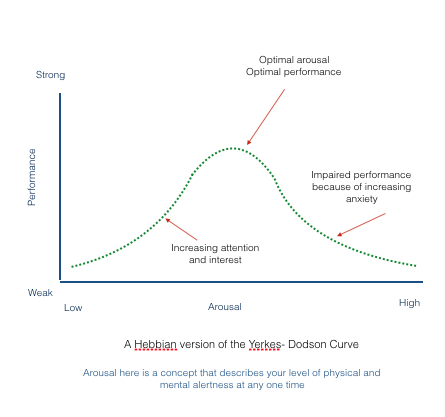Can music improve productivity?
Productivity is an area we can always improve.
Can music have a positive impact?
We look at some studies which suggest that there may be some positive benefits.
Studies by Yerkes and Dodson (1908) relate everyday tasks performance to levels of physical and mental alertness at any one time.
This model and related studies* suggest that each person’s ‘base’ level of psycho – physiological arousal is somewhere on the curve shown below.
The peak of the curve is the optimum point where we are able to achieve our best performance.
Music is an agent that can move our portion on the curve. This can increase by pushing us to optimum or lower by pushing us over the top. The movement will depend on various characteristics of the music including its complexity, volume and familiarity.
Cognitive engagement describes the level of attention that we are able to devote to a task. An optimal state of engagement is a ‘flow state’ where motivation is focused on the job in hand and task performance is optimised**
Music has the potential to contribute to a flow state. In theory we have a certain amount of attention that we can devote to tasks; too much we experience anxiety, too little we may drift into boredom. Music can soak up extra unused attention during a simple task that may otherwise contribute to boredom and need to get distracted. The impact of this will be different for each person.
What about the impact of personality preferences?
A 1967 study by Hans Eysenck stated that extrovert and introvert personality types varied. They noted that extraverts had a lower baseline level than introverts. Introverts generally seek out less stimulation from the external world, preferring quieter and more familiar environments. Related studies*** suggest that extraverts should benefit more from musical stimulation whereas introverts probably will not.
I have noticed this with colleagues and family but overall I suggest that everyone shares changes in mood and preference. Sometimes we find music helps our concentration with a task but at other times we prefer silence. There may be some merit in allowing people to listen to personal music at selected times in the workplace if it helps their own work style.
What is clear from the studies is that general mass produced music pumped across a work place is unlikely to work for many of the people much of the time and is highly unlikely to improve productivity.
Sources referred to:
“You are the Music” by Victoria Williamson.2014
** Halpern A.R, and Müllensiefen, D (2008) ‘Effects of timbre and tempo change on memory for music”
***Adrian Furnham & Anna Bradley


